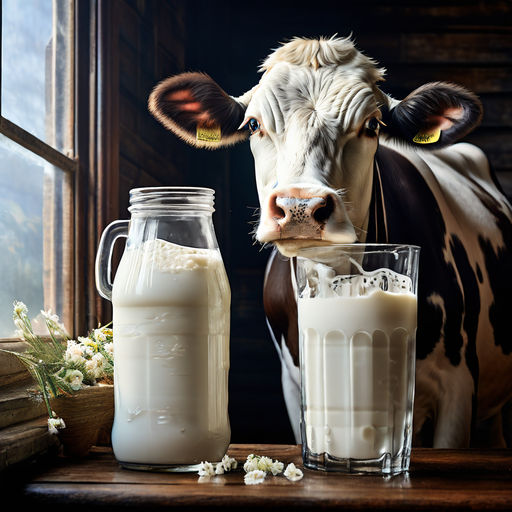Cow’s milk, often referred to as nature’s nectar, has been a dietary staple for centuries. However, for individuals with certain health conditions, such as diabetes, consuming milk can be problematic due to its high fat and carbohydrate content. Diabetes, also known as sugar disease, is a chronic condition characterized by high blood sugar levels. One of the key factors in diabetes management is the regulation of insulin, a hormone that helps the body absorb sugar from the bloodstream. For individuals with diabetes, the lack of insulin or the body’s inability to use insulin effectively can lead to serious complications, including damage to vital organs like the kidneys, liver, eyes, and heart.
Understanding Diabetes and Insulin
Diabetes occurs in two main forms: Type 1 and Type 2. Type 1 diabetes is an autoimmune condition in which the body’s immune system mistakenly attacks and destroys the insulin-producing cells in the pancreas. This results in a lack of insulin production, requiring affected individuals to take insulin daily to manage their blood sugar levels. Type 2 diabetes, on the other hand, is characterized by insulin resistance, where the body’s cells become resistant to the effects of insulin, leading to elevated blood sugar levels. While Type 2 diabetes can often be managed through lifestyle changes and medication, some individuals may also require insulin therapy.
The Innovation: Insulin Milk
In a groundbreaking development, scientists have successfully engineered a cow whose milk contains higher levels of insulin. This innovation has the potential to revolutionize diabetes treatment, offering a natural and accessible source of insulin for patients. By introducing a segment of human DNA containing the insulin protein into a cow’s embryo, scientists were able to create a cow that produces milk containing insulin. This milk, when consumed, can help supplement the insulin needs of diabetes patients, potentially reducing their dependence on traditional insulin therapy.
The Impact on Diabetes Patients
The introduction of insulin milk could have a profound impact on the lives of diabetes patients worldwide. With an estimated 50 crore diabetes patients globally, including 10 crore in India alone, the availability of insulin-rich milk could provide a more affordable and sustainable treatment option for many. For Type 1 diabetes patients, who require daily insulin injections, insulin milk could offer a more convenient and natural alternative, potentially improving their quality of life.
The Science Behind Insulin Milk
The process of creating insulin milk involves extracting a segment of human DNA containing the insulin protein and introducing it into a cow’s embryo. The engineered embryo is then transferred into the uterus of a normal cow, where it develops into a calf. Once the cow reaches maturity, it is capable of producing milk containing the human insulin protein. This milk can then be collected and processed to extract the insulin, which is identical to the insulin produced by the human body.

Matt Wheeler’s Breakthrough
The pioneering work in developing insulin milk was led by animal scientist Matt Wheeler at the University of Illinois, USA. Wheeler’s team successfully engineered the cow capable of producing insulin-rich milk, demonstrating the potential of genetic engineering in agriculture and medicine. The details of this groundbreaking research have been published in the Biotechnology Journal, highlighting the scientific and practical implications of this innovation.
Future Prospects
The development of insulin milk opens up new possibilities for the treatment of diabetes and other conditions requiring insulin therapy. The availability of a natural and sustainable source of insulin could reduce the cost and logistical challenges associated with traditional insulin production and distribution. Furthermore, this innovation could pave the way for similar advancements in genetic engineering and biotechnology, offering solutions to a range of health and agricultural challenges.
Ethical and Safety Considerations
While the potential benefits of insulin milk are promising, there are ethical and safety considerations that must be addressed. Concerns have been raised regarding the impact of genetic modification on animal welfare and the environment. Additionally, the safety of consuming insulin-rich milk must be thoroughly evaluated to ensure that it poses no harm to human health.
Click Here For Agriculture Innovations
Conclusion
Insulin milk represents a significant advancement in the field of diabetes treatment, offering a natural and potentially more accessible source of insulin for patients. This innovative approach highlights the intersection of agriculture, biotechnology, and medicine, demonstrating the potential of genetic engineering to address complex health challenges. While further research and evaluation are needed, insulin milk holds great promise for improving the lives of diabetes patients worldwide.
FAQs
- Is insulin milk safe for consumption?
- Insulin milk undergoes rigorous testing to ensure its safety for consumption. However, individuals with specific dietary restrictions or health conditions should consult a healthcare professional before consuming.
- How is insulin extracted from milk?
- Insulin is extracted from milk using specialized processes that isolate and purify the insulin protein. This purified insulin is then used for therapeutic purposes.
- Can insulin milk replace traditional insulin therapy?
- While insulin milk shows promise as a natural source of insulin, it is not intended to replace traditional insulin therapy. It may serve as a supplemental or alternative option for some individuals.
- Are there any ethical concerns associated with insulin milk production?
- The production of insulin milk raises ethical considerations regarding genetic modification and animal welfare. These concerns should be carefully addressed through ethical guidelines and regulatory oversight.
- What are the potential implications of insulin milk for global health?
- Insulin milk has the potential to significantly impact global health by providing a more accessible and sustainable source of insulin for diabetes patients. This could help reduce the burden of diabetes-related complications and improve overall quality of life.










